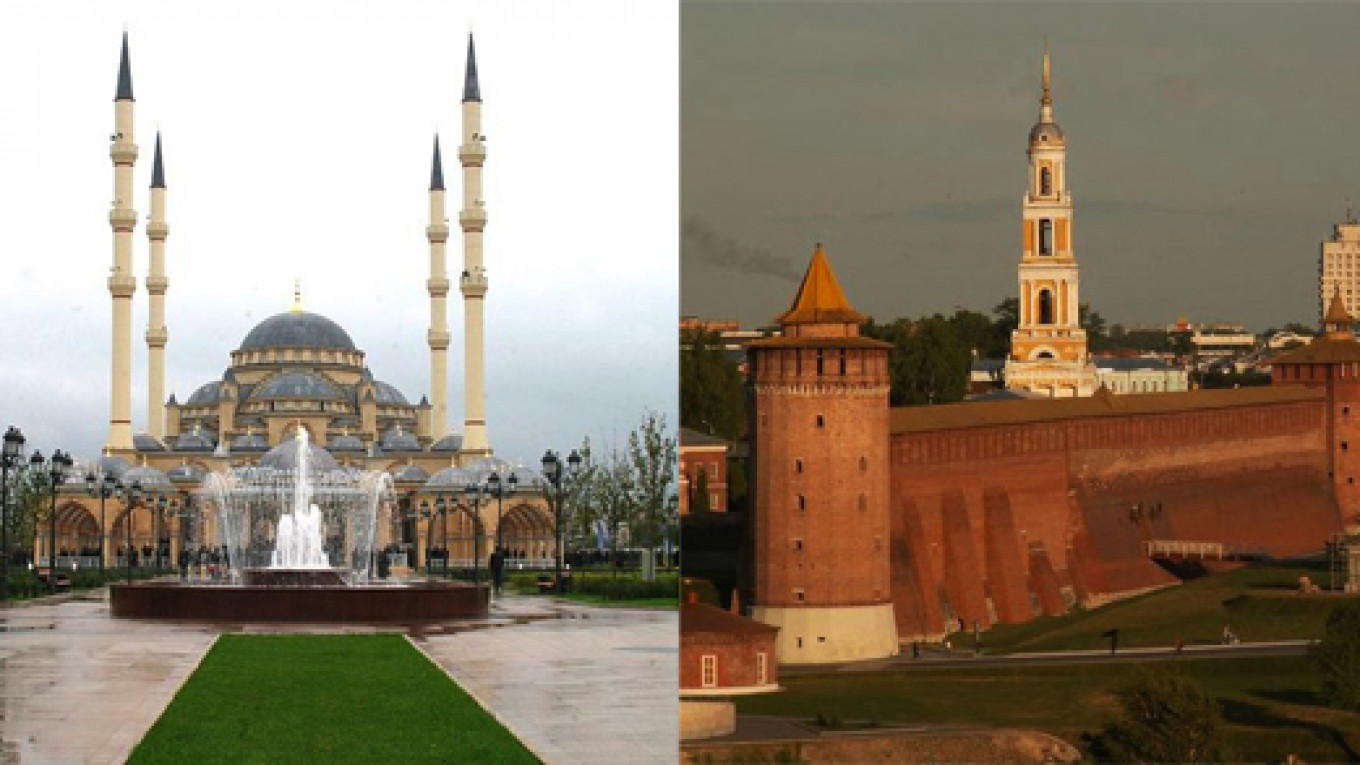The Rossia 10 contest, created by the Russian Geographical Society and the Russian state broadcasting company, aimed to unite citizens around the country by allowing them to vote for 10 visual symbols of Russia from among the country's architectural and artistic heritage.
Now in the third and final round of voting, the contest has descended into politics and bickering as Chechen leader Ramzan Kadyrov has complained of voting violations and demanded that the Akhmat Kadyrov Heart of Chechnya Memorial Mosque be removed from the contest.
"We have a well-founded belief that millions of votes cast for the Heart of Chechnya were not counted, even though money was paid to MegaFon and Beeline," Kadyrov said, Interfax reported. The contest allows voting via text message for a nominal fee paid to cellular providers.
The controversy apparently began shortly before the close of the second stage of voting at 12:00 a.m. Moscow time on Aug. 30. According to the Kavkazsky Uzel newspaper, Grozny residents noticed that at about 9:30 p.m., mobile operators MegaFon and Beeline began to block voting for the Heart of Chechnya Mosque, though users' accounts were still charged for attempted votes.
"That evening, many young people who had tried to vote gathered on the square near the mosque, and everyone complained that at around 9:30 p.m. voting was impossible. Everyone received a text message saying 'that service is temporarily unavailable,'" a Grozny resident told the Kavkazsky Uzel.
As voting closed, it became apparent that the Kolomna Kremlin had beaten Grozny's mosque to win first place in the second round, with 38.6 million votes to the mosque's 38.2 million. Grozny had previously led by a small margin for the duration of the contest.
In the wake of the news, Kadyrov was quick to express his disapproval of the vote's results, stating on Aug. 30 that there was cheating in the voting and that he would take up the matter with the Investigative Committee and the Prosecutor General's Office. "We thought that participation in the competition would be fair … but now we are certain that all barriers were used to ensure that the Heart of Chechnya Mosque would not hold the place that it lawfully occupied," Kadyrov said, Interfax reported.
Later the same day, Kadyrov announced that he had requested that the Heart of Chechnya Mosque be removed from the competition. The mosque is named after Kadyrov's father, former Chechen leader Akhmat Kadyrov, who first started the mosque's construction and was assassinated in 2004. The largest mosque in Russia, it has become one of the most recognizable symbols of the reconstruction of Grozny after years of warfare.
The organizers of the Rossia 10 competition were quick to respond to Kadyrov's statements, confirming that Kadyrov had removed the Heart of Chechnya Mosque from the competition and that he had the right to do so.
As for allegations of cheating, Natalia Sokolova, PR director for the Russian Geographical Society, said the RGS was not capable of monitoring the voting process. However, Sokolova was adamant that no cheating had occured, saying "I can say with full authority that there were not, nor could there have been, any violations during the voting period," Moskovsky Komsomolets reported.
Sokolova noted that even if the mosque had not finished first, it still would have proceeded into the next round had Kadyrov not removed it from the competition. "For Ramzan Akhmatovich, it has become a matter of honor that the mosque hold first place," Sokolova said. "Once again, Kadyrov had to show that he was the coolest."
Representatives of the Kolomna Kremlin expressed their surprise at Kadyrov's allegations in an interview with RSN radio: "We vote just the same way here, with Internet voting and SMS voting. We don't feel any obsessive emotions or passions about the status of the Kolomna Kremlin. And when we were in second place, it was all the same to us. We haven't been experiencing any psychosis or desires to start doing more," said Kolomna Kremlin press secretary Alexander Manushkin.
It would seem that Kadyrov is not the only one getting emotional about Rossia 10: On Sunday, a representative of Rostov region said that more than 3,000 people would gather in Rostov-on-Don to sing a hymn in support of the Novocherkassk Military Cathedral of the Ascension.
Later that day, a crowd of 3,681 cossacks gathered to sing the hymn “The Quiet and Orthodox Don Churned and Surged Upwards.” After the performance, Leonid Senatorov, representative of the “Russian Records” book, presented Rostov region head Vasily Golubev with a certificate recognizing the performance as Russia’s largest flash mob. The hymn was sung on the day celebrating the icon “Our Lady of the Don.”
Though the cathedral has passed into the third round of the competition, it is an underdog, holding 17th place with only 1.5 million votes.
Contact the author at g.golubock@imedia.ru
A Message from The Moscow Times:
Dear readers,
We are facing unprecedented challenges. Russia's Prosecutor General's Office has designated The Moscow Times as an "undesirable" organization, criminalizing our work and putting our staff at risk of prosecution. This follows our earlier unjust labeling as a "foreign agent."
These actions are direct attempts to silence independent journalism in Russia. The authorities claim our work "discredits the decisions of the Russian leadership." We see things differently: we strive to provide accurate, unbiased reporting on Russia.
We, the journalists of The Moscow Times, refuse to be silenced. But to continue our work, we need your help.
Your support, no matter how small, makes a world of difference. If you can, please support us monthly starting from just $2. It's quick to set up, and every contribution makes a significant impact.
By supporting The Moscow Times, you're defending open, independent journalism in the face of repression. Thank you for standing with us.
Remind me later.






